No products in the cart.
Sale
Antide acetate | CAS 625092-10-6 | Potent LHRH Antagonist for Prostate Cancer Research
Original price was: $32.00.$26.00Current price is: $26.00.
Antide acetate (D-21074) is a potent luteinizing hormone-releasing hormone (LHRH) antagonist that inhibits gonadotropin secretion. It is commonly used in prostate cancer and reproductive endocrinology research.
Description
Product Description
Antide acetate (D-21074) is a synthetic decapeptide belonging to the class of luteinizing hormone-releasing hormone (LHRH) antagonists. It acts by competitively blocking the binding of endogenous gonadotropin-releasing hormone (GnRH) to pituitary receptors, thereby inhibiting the secretion of luteinizing hormone (LH) and follicle-stimulating hormone (FSH). This results in a reversible suppression of gonadal steroidogenesis and a rapid reduction of testosterone levels in males, making it an essential compound for the study of hormone-dependent diseases such as prostate cancer.
Unlike LHRH agonists, which initially trigger a transient surge in gonadotropin release before downregulation, Antide acetate produces an immediate inhibitory effect without the initial “flare” response. This makes it an attractive model compound for research in androgen deprivation and pituitary regulation.
Antide acetate has also been investigated for its role in reproductive endocrinology, fertility regulation, and hormone-responsive tumor biology. In experimental models, it reduces circulating testosterone within hours of administration and maintains suppression with sustained exposure. The peptide’s high potency, receptor selectivity, and stability in vitro make it a valuable research tool in understanding the hypothalamic–pituitary–gonadal axis.
Beyond oncology, Antide acetate serves as a comparative reference for next-generation LHRH antagonists with improved pharmacokinetic and safety profiles. It provides insights into peptide hormone receptor antagonism, endocrine modulation, and peptide drug design strategies in preclinical settings.
Product Specifications
| Property | Description |
|---|---|
| Product Name | Antide acetate |
| CAS Number | 625092-10-6 |
| Synonyms | D-21074; LHRH antagonist peptide |
| Molecular Formula | C₆₆H₈₁N₁₃O₁₁S |
| Purity | ≥99% |
| Form | Lyophilized peptide powder |
| Storage | −20°C, protected from light and moisture |
| Solubility | Soluble in water, PBS, or DMSO |
| Stability | Stable for ≥12 months under recommended conditions |
| Category | LHRH antagonist peptide; Hormonal modulator |
| Applications | Prostate cancer research; Endocrine regulation studies; Gonadotropin suppression models |
| Research Area | Oncology, Endocrinology, Reproductive Biology |
| Intended Use | For laboratory research use only |
Mechanism of Action
Antide acetate functions as a potent antagonist of the gonadotropin-releasing hormone receptor (GnRHR). By occupying GnRHR binding sites on the anterior pituitary, it prevents GnRH from activating its signaling cascade, which normally triggers the synthesis and secretion of LH and FSH. The inhibition of these gonadotropins leads to a rapid and reversible suppression of gonadal steroid hormones such as testosterone and estradiol.
This pharmacodynamic mechanism underlies its utility in androgen-dependent tumor research, particularly in prostate carcinoma models. Unlike LHRH agonists, Antide acetate avoids the initial hormonal flare that may exacerbate tumor growth before suppression begins. Its immediate downregulation of gonadotropins provides a clear pharmacological profile ideal for studying endocrine feedback mechanisms, pituitary receptor sensitivity, and steroid biosynthesis pathways.
At the molecular level, Antide acetate’s antagonistic binding results in receptor conformational changes that prevent G-protein coupling and downstream signal transduction. This disrupts the cyclic AMP (cAMP) and phospholipase C pathways associated with gonadotropin secretion. The resulting hormonal blockade provides a precise model for studying hormonal control and pituitary desensitization processes in vivo and in vitro.
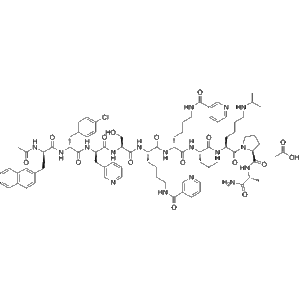
Side Effects
In research models, Antide acetate may induce transient hormonal imbalances due to gonadotropin suppression. Potential observations include reduced testosterone levels, temporary infertility, and changes in secondary sexual characteristics. Some studies report mild injection-site irritation in animal models.
No systemic toxicity or organ-specific damage has been noted at research doses, but appropriate laboratory safety measures and handling protocols should always be observed.
Keywords
Antide acetate, LHRH antagonist, GnRH antagonist peptide, hormonal modulator, androgen deprivation research, prostate cancer compound, reproductive biology peptide, endocrine suppression, D-21074
Shipping Guarantee
All shipments are handled using validated cold-chain logistics to preserve peptide integrity. Each package is sealed in moisture-proof containers with secondary protective wrapping and continuous temperature monitoring. Products are shipped via express international couriers with full tracking and insurance coverage.
Trade Assurance
We ensure product authenticity, verified ≥99% purity, and compliance with analytical standards (HPLC, MS, and NMR). Each batch is supplied with a Certificate of Analysis (CoA). Our trade assurance policy guarantees replacement or refund for any deviation from listed specifications.
Payment Support
We provide flexible and secure global payment options to support international research transactions. Accepted payment methods include PayPal, major credit cards (Visa, MasterCard, American Express), telegraphic transfer (T/T), and cryptocurrencies (USDT, Bitcoin, Ethereum). All transactions are protected by industry-standard encryption and verified payment gateways to ensure confidentiality and fund security.
Disclaimer
All products listed are intended for laboratory research use only and not for human or veterinary use. They are not drugs, medical devices, or diagnostics and should not be administered to humans or animals. Researchers must handle all materials in accordance with institutional biosafety and chemical safety guidelines. The information provided is for scientific reference only and does not imply therapeutic efficacy, safety, or regulatory approval.
Additional information
| Weight | 0.8 kg |
|---|---|
| Dimensions | 65 × 86 × 65 cm |
What is Antide acetate used for in research?
Antide acetate is primarily used to study the suppression of gonadotropin secretion and hormone-dependent cancer mechanisms, particularly in prostate cancer models.
How does Antide acetate differ from LHRH agonists?
Unlike LHRH agonists that cause an initial surge of hormones, Antide acetate immediately inhibits LH and FSH release without a flare effect.
What is the purity of Antide acetate?
All batches are verified to have ≥99% purity by HPLC, MS, and NMR analyses.
What are the recommended storage conditions?
Store the peptide at −20°C, protected from light and moisture, for long-term stability.
Can Antide acetate be dissolved in aqueous buffers?
Yes, it is soluble in water, PBS, or DMSO depending on the experimental design.
What research areas commonly use Antide acetate?
It is widely applied in endocrinology, oncology, reproductive biology, and hormone regulation studies.
Is Antide acetate suitable for human or veterinary use?
No. It is strictly intended for laboratory research use only.
What safety precautions are necessary?
Use personal protective equipment (PPE) and follow standard biosafety practices when handling peptide materials.
Does Antide acetate have reversible effects?
Yes. Hormonal suppression induced by Antide acetate is reversible upon discontinuation.
How is product authenticity verified?
Each batch comes with a Certificate of Analysis (CoA) verifying identity, purity, and analytical performance.

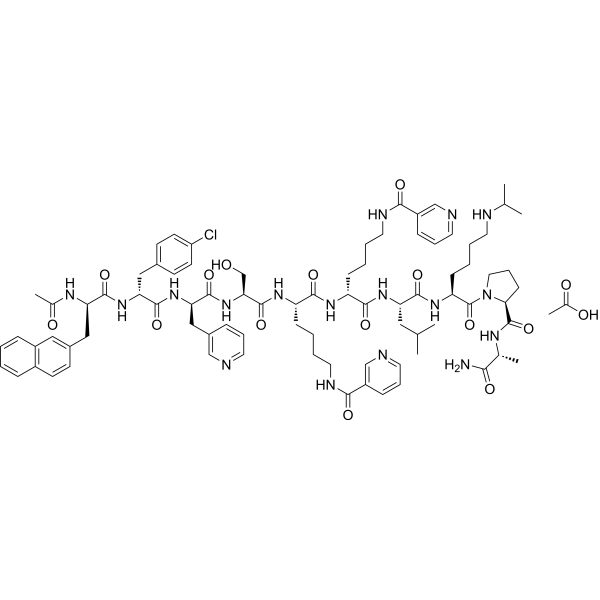


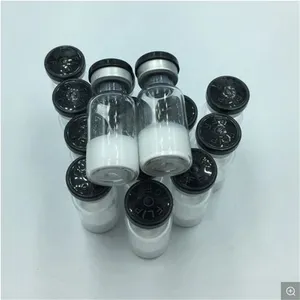
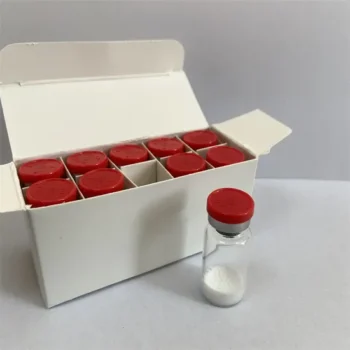
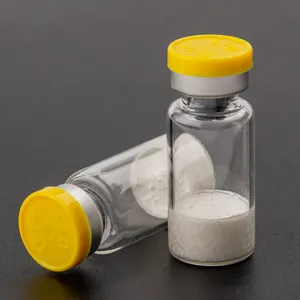
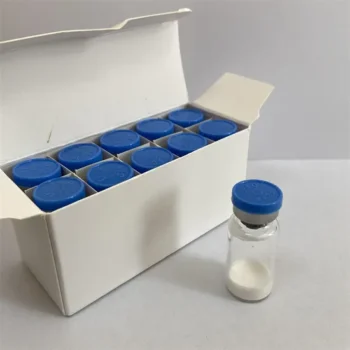
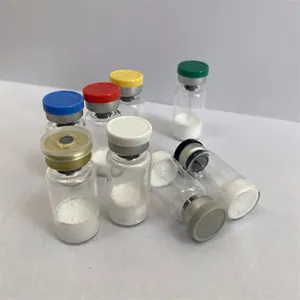

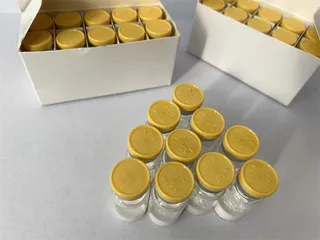
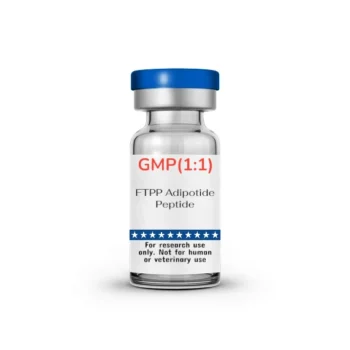
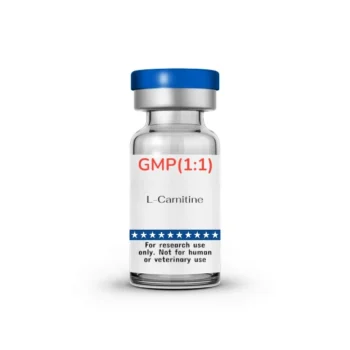
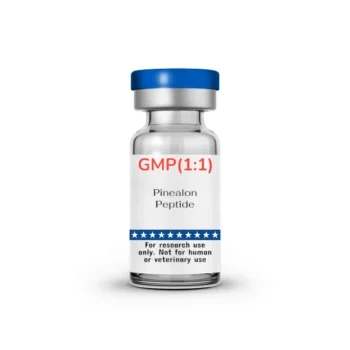


Reviews
There are no reviews yet.